
Edgar Allan Poe was an American writer, poet, editor, and literary critic. Poe is best known for his poetry and short stories, particularly his tales of mystery and the macabre. He is widely regarded as a central figure of Romanticism in the United States and of American literature as a whole, and he was one of the country's earliest practitioners of the short story. He is also generally considered the inventor of the detective fiction genre and is further credited with contributing to the emerging genre of science fiction. Poe was the first well-known American writer to earn a living through writing alone, resulting in a financially difficult life and career.
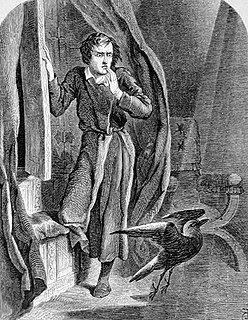
"The Raven" is a narrative poem by American writer Edgar Allan Poe. First published in January 1845, the poem is often noted for its musicality, stylized language, and supernatural atmosphere. Sitting on a bust of Pallas, the raven seems to further distress the protagonist with its constant repetition of the word "Nevermore". The poem makes use of folk, mythological, religious, and classical references.

The Edgar Allan Poe Awards, popularly called the Edgars, are presented every year by the Mystery Writers of America, based in New York City. Named after American writer Edgar Allan Poe (1809–1849), a pioneer in the genre, the awards honor the best in mystery fiction, non-fiction, television, film, and theater published or produced in the previous year.
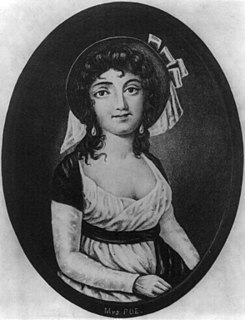
Elizabeth "Eliza" Arnold Hopkins Poe was an English actress and the mother of the American author Edgar Allan Poe.

"Ulalume" is a poem written by Edgar Allan Poe in 1847. Much like a few of Poe's other poems, "Ulalume" focuses on the narrator's loss of his beloved due to her death. Poe originally wrote the poem as an elocution piece and, as such, the poem is known for its focus on sound. Additionally, it makes many allusions, especially to mythology, and the identity of Ulalume herself, if a real person, has been a subject of debate.
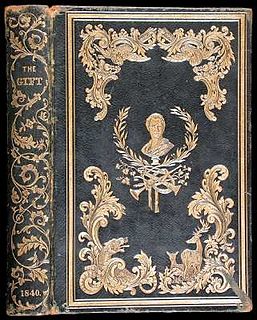
"William Wilson" is a short story by Edgar Allan Poe, first published in 1839, with a setting inspired by Poe's formative years on the outskirts of London. The tale follows the theme of the doppelgänger and is written in a style based on rationality. It also appeared in the 1840 collection Tales of the Grotesque and Arabesque, and has been adapted several times.

"The Facts in the Case of M. Valdemar" is a short story by American author Edgar Allan Poe about a mesmerist who puts a man in a suspended hypnotic state at the moment of death. An example of a tale of suspense and horror, it is also, to a certain degree, a hoax, as it was published without claiming to be fictional, and many at the time of publication (1845) took it to be a factual account. Poe toyed with this for a while before admitting it was a work of pure fiction in his marginalia.

Poe Toaster is the media sobriquet used to refer to an unidentified person who, for over seven decades, paid an annual tribute to American author Edgar Allan Poe by visiting the cenotaph marking his original grave in Baltimore, Maryland, in the early hours of January 19, Poe's birthday. The shadowy figure, dressed in black with a wide-brimmed hat and white scarf, would pour himself a glass of cognac and raise a toast to Poe's memory, then vanish into the night, leaving three roses in a distinctive arrangement and the unfinished bottle of cognac. Onlookers gathered annually in hopes of glimpsing the elusive Toaster, who did not seek publicity and was rarely seen or photographed.
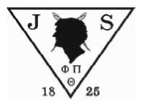
The Jefferson Literary and Debating Society is the oldest student organization at the University of Virginia, having been founded on July 14, 1825, in Room Seven, West Lawn. As such, it is one of the oldest collegiate societies in North America. It is also the second oldest Greek-lettered organization in the United States, after Phi Beta Kappa. The Society's Greek-letters are ΦΠΘ, initials for Φίλοί, Πατρίς, θεός. Its Latin motto, Haec Olim Meminisse Iuvabit, is taken from Virgil's Aeneid and roughly translated, "In the future it will be pleasing to remember these things."

Castle Amber is a Dungeons & Dragons adventure module designed by Tom Moldvay. This was the second module designed for use with the Expert D&D set. The module is in part an adaptation of Clark Ashton Smith's Averoigne stories, and set in the fictional medieval French province of that name.
Stephen Mark Rainey is an author of novels, short stories, and various works of nonfiction. From 1987 to 1997, he edited Deathrealm, a magazine of horror and dark fantasy fiction, for which he won several awards for Best Editor, including the International Horror Guild Award, 1995.
Kealan Patrick Burke is an author. Some of his works include the novels Kin, Currency of Souls, Master of the Moors, and The Hides, the novellas The Turtle Boy and Vessels, and the collections Ravenous Ghosts, The Number 121 to Pennsylvania & Others, Theater Macabre and The Novellas. He has also appeared in a number of publications, including Postscripts, Cemetery Dance, Grave Tales, Shivers II, Shivers III, Shivers IV, Looking Glass, Masques V, Subterranean #1, Evermore, Inhuman, Horror World, Surreal Magazine, and Corpse Blossoms. Burke also edited the anthologies: Taverns of the Dead, Brimstone Turnpike, Quietly Now: A Tribute to Charles L. Grant, the charity anthology Tales from the Gorezone and Night Visions 12.
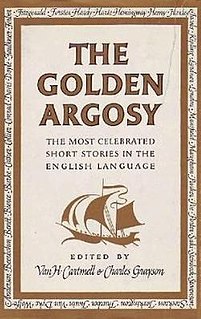
The Golden Argosy: The Most Celebrated Short Stories in the English Language is an anthology edited by Charles Grayson and Van H. Cartmell, and published by Dial Press in 1955. It is famous for being the favorite book of novelist Stephen King.
Thomas Piccirilli was an American novelist and short story writer.
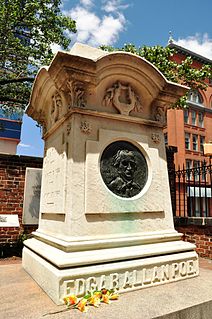
The death of Edgar Allan Poe on October 7, 1849, has remained mysterious. The circumstances leading up to it are uncertain, and the cause of death is disputed. On October 3, the American author was found delirious in Baltimore, Maryland, "in great distress, and ... in need of immediate assistance", according to the man who found him, Joseph W. Walker. He was taken to the Washington College Hospital, where he died at 5 a.m. on Sunday, October 7. He was 40 years old. Poe was never able to explain how he came to be in this condition.
"The Man That Was Used Up", sometimes subtitled "A Tale of the Late Bugaboo and Kickapoo Campaign", is a short story and satire by Edgar Allan Poe. It was first published in 1839 in Burton's Gentleman's Magazine.

Edgar Allan Poe has appeared in popular culture as a character in books, comics, film, and other media. Besides his works, the legend of Poe himself has fascinated people for generations. His appearances in popular culture often envision him as a sort of "mad genius" or "tormented artist", exploiting his personal struggles. Many depictions of Poe interweave elements of his life with his works, in part due to Poe's frequent use of first-person narrators, suggesting an erroneous assumption that Poe and his characters are identical.
The Mind's Eye was a theater company which produced dramatized radio adaptations of various written works, most notably the 1979 National Public Radio broadcast of J.R.R. Tolkien's The Lord of the Rings and in 1980, The Hobbit. Its works have been distributed by Soundelux and Highbridge Audio. Prominent players include Bernard Mayes, Erik Bauersfeld, John Vickery, Lou Bliss, Gail Chugg, Tom Luce, Ray Reinhardt, James Arrington, Pat Franklyn, Wanda McCaddon, Rick Cimino, Joe Gostanian, John Joss, Karen Hurley, Kevin Gardiner, Darryl Ferreira, and Carl Hague.
Appointment with Fear was a horror drama series originally broadcast on BBC Radio in the 1940s and 1950s, and revived on a number of occasions since. The format comprised a dramatised horror story of approximately half an hour in length, introduced by a character known as the Man in Black. The plays themselves were a mixture of classic horror stories by writers such as Edgar Allan Poe, M. R. James and W. W. Jacobs, and commissioned stories by new or established writers. Many of the stories in the early series were written or adapted by John Dickson Carr.












